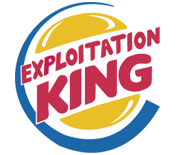

LUCAS BENITEZ ADDRESS
BK SHAREHOLDER MEETING
NOVEMBER 29, 2007My name is Lucas Benitez, and I am a founding member of the Coalition of Immokalee Workers. I am also a Robert F. Kennedy Human Rights Award laureate for my work and that of my organization in fighting modern-day slavery in Florida’s fields.
I am here today because it is still not too late for Burger King’s board members and shareholders to help the company reverse course and join other fast-food industry leaders in requiring higher standards of your company’s Florida tomato suppliers.
The agreements we have reached with Yum Brands and McDonald’s have placed all of us on the threshold of a more modern, more humane agricultural industry in this state, a change that is long, long overdue. Burger King today has both the opportunity and the ability to help ensure this brighter future for Florida agriculture. But it has so far chosen to use its considerable influence to impede that future, rather then ensure it.
Worse yet, recent press reports have revealed that Burger King management has made the tactical decision to work in alliance with the state’s most regressive growers in an effort to turn back the clock and take back from farmworkers the small but meaningful gains in wages and respect we have already won.
It is crucial that Burger King’s directors and major shareholders know that this is a radical decision on your company’s part. And you don’t have to take our word for it – you can read the editorial pages in any major city across the state, and outside Florida as well, where Burger King’s decision has been unanimously criticized, and in the harshest of terms. One of those editorials concluded with this mandate: “OK, consumers, sic ‘em.” The latest, an editorial in the Palm Beach Post, concludes, "Consumers who take their business to Taco Bell and McDonald's are contributing to fair treatment of Florida's farmworkers. At Burger King, consumers are buying into intimidation and the continued exploitation of cheap labor." Surely this is not the image you seek for your company.
There can be no doubt that Burger King’s decision has put the company at a disadvantage with its key industry competitors. The position Burger King’s management has taken is not justifiable, nor is it by any means sustainable. You will hear your CEO say that farmworkers are not in fact poor and earn surprisingly good wages, many better than the majority of Floridians. Ask yourself, honestly, how true that rings to you and you will have a sense of how it has been received by the public. Your CEO will say that BK has a robust code of conduct and that they have always maintained an open door to working with the CIW on violations in its supply chain. Ask him to share with you the paper trail of their monitoring over the years, and the actions they have taken to correct suppliers found to be out of compliance.
The danger to Burger King’s image being done by management’s decision is simply too great to accept empty assurances that the company is on the right track – because the right track, ultimately, is defined by the public, and the public is telling Burger King, in no uncertain terms, that it’s time to take a stand for human rights. Burger King has an excellent opportunity to do right by workers, consumers, and itself alike. We can only hope that you as directors and major shareholders do a better job than company management at recognizing the opportunity at hand.
Last week, my colleagues and I were flown to London to receive the 2007 Anti-Slavery International award for our work in uncovering and helping to prosecute five farmworker slavery operations, involving more than 1,000 people held against their will by their employers, in Florida´s fields in the last decade. These cases belie your management’s claim that all is well in the fields of Florida. But instead of accepting our invitation to work together to address the reality of modern-day slavery in Florida, and the sweatshop conditions that give rise to it, your CEO has opted to fight us by partnering with the most conservative elements of the very industry in which these slavery cases continue to flourish. Again, the public and the press have taken note of your CEO´s choice and roundly condemned it.
My question is this: How much longer do the directors of Burger King plan on allowing the company to be pilloried in the press and negatively compared to its competitors for a decision by its management that is not justifiable and is correctable?